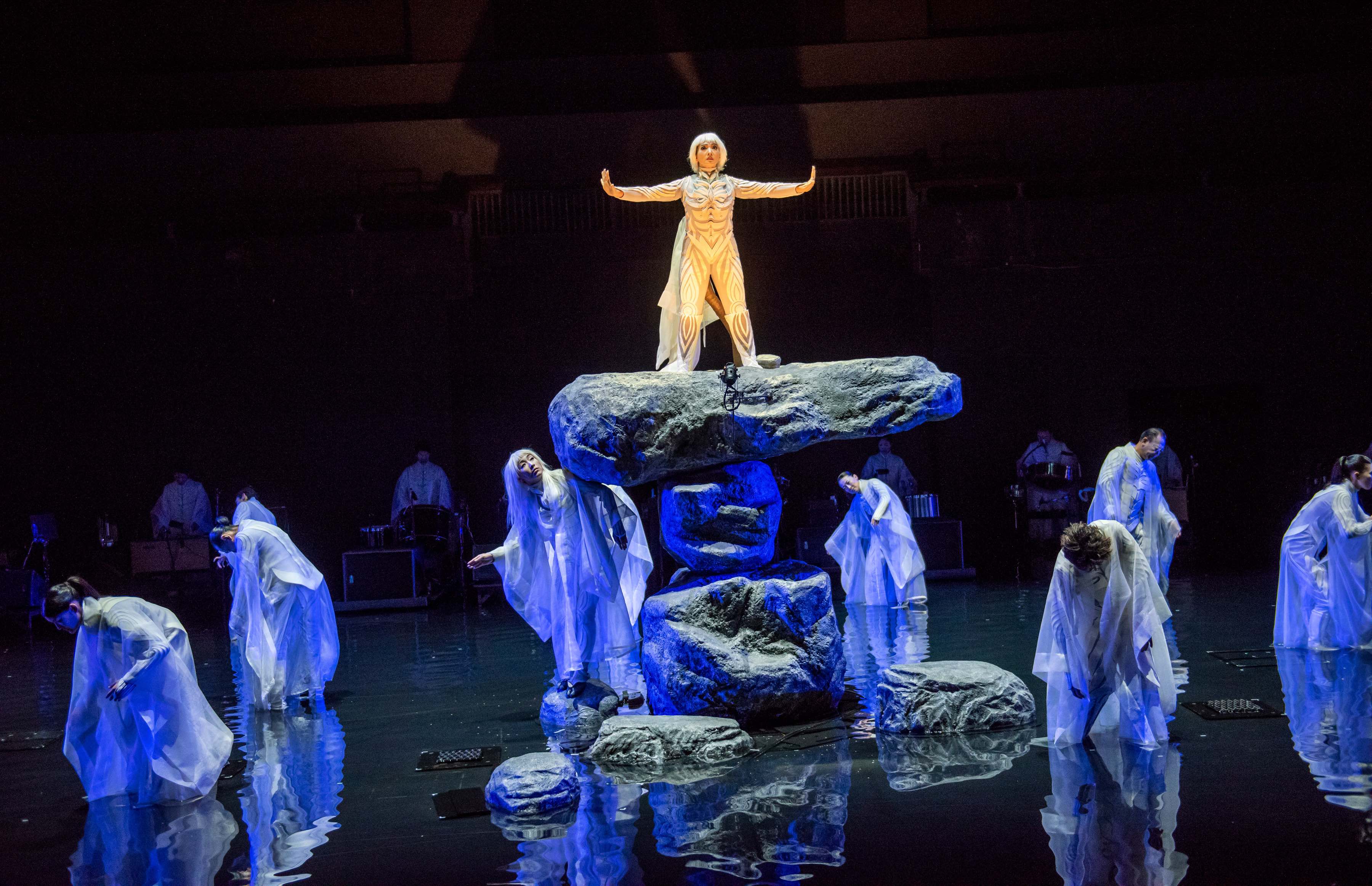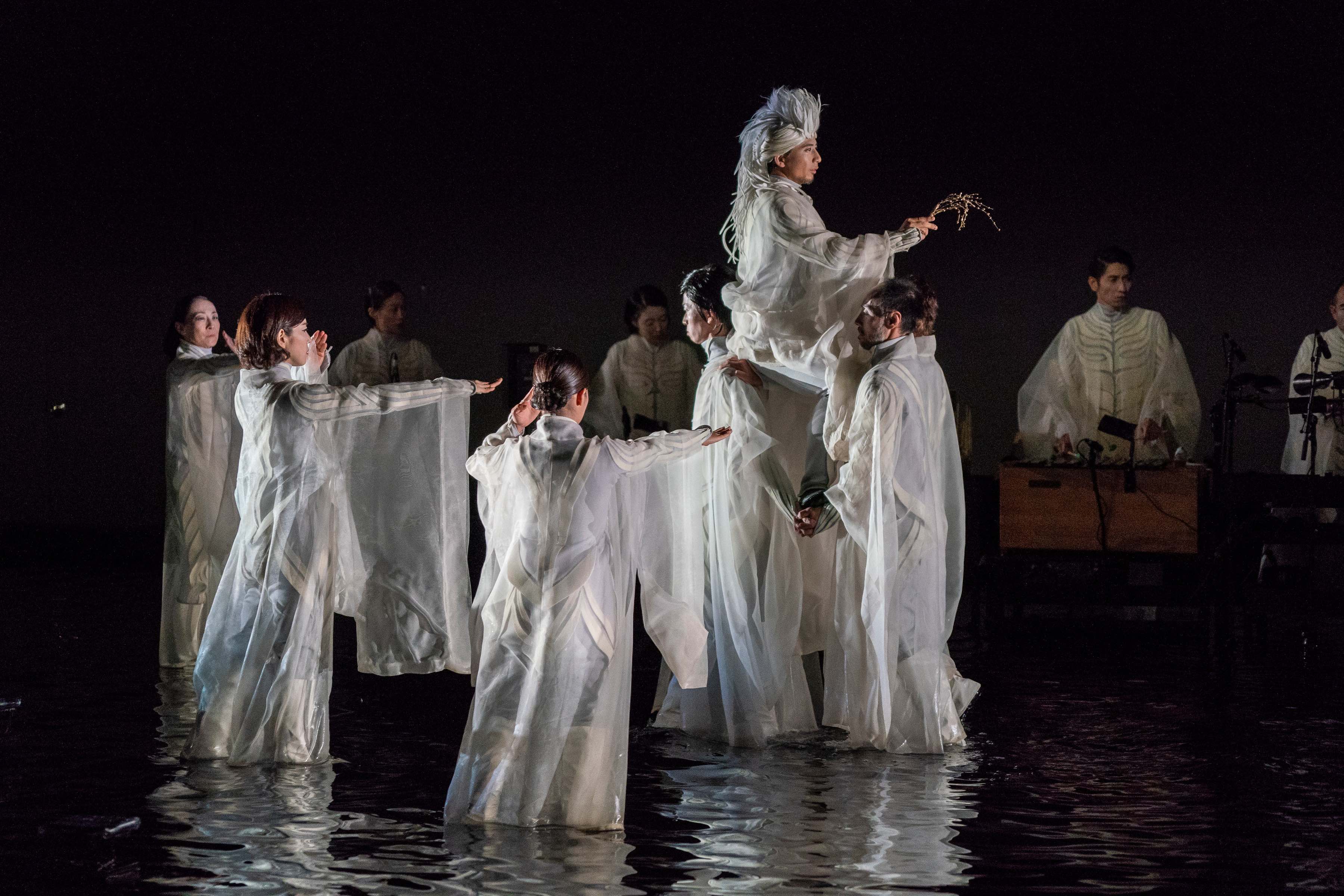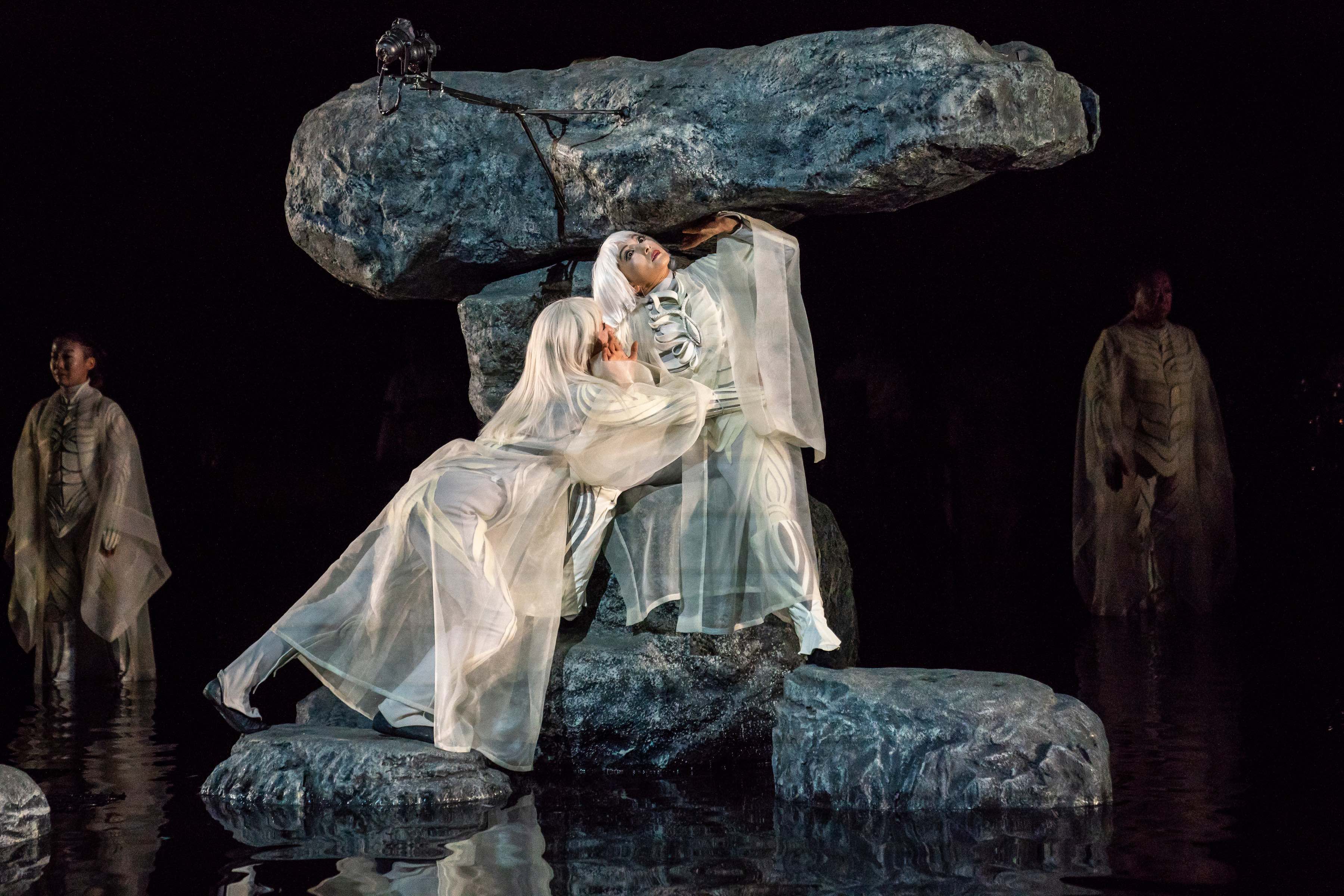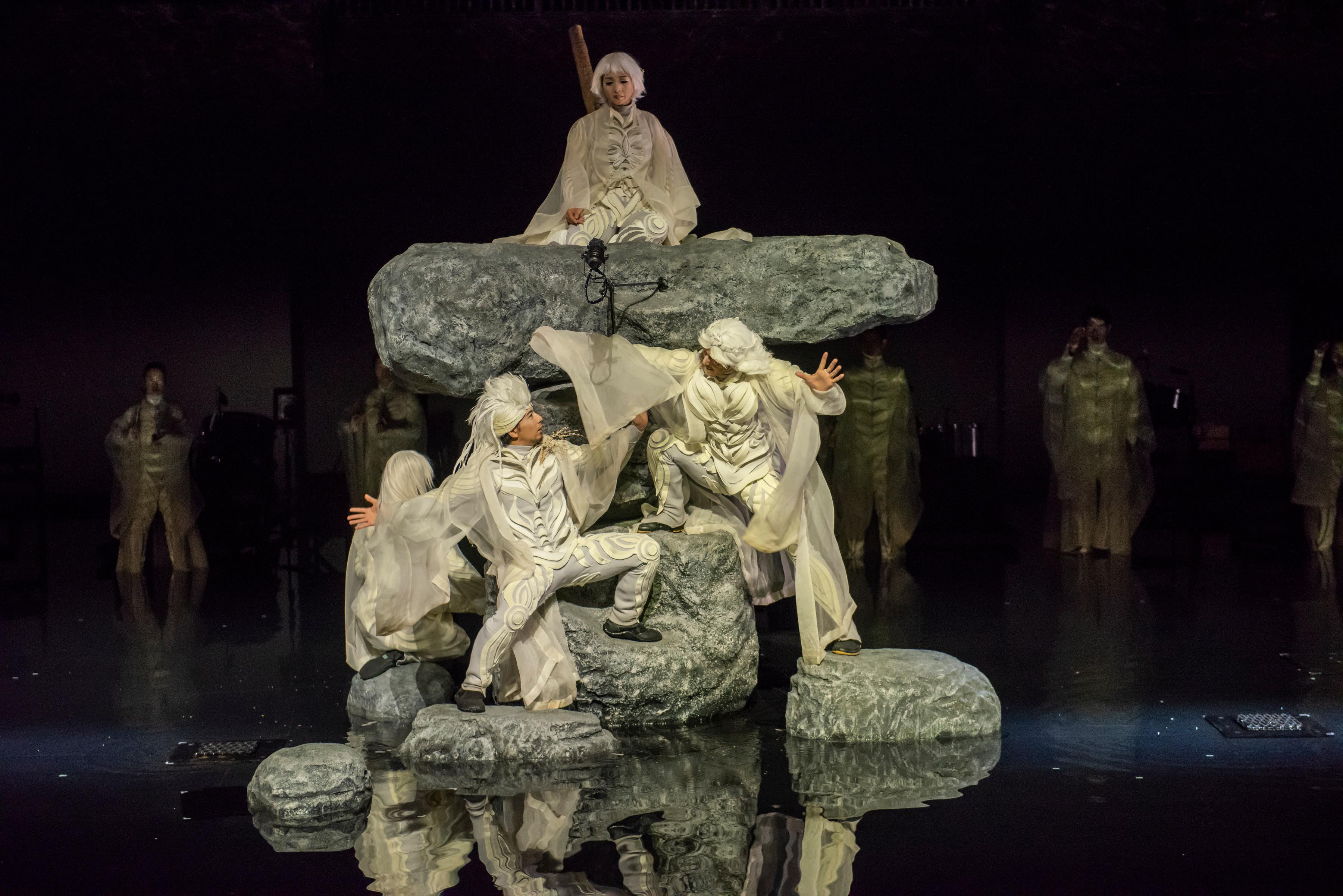Out of the whole sorry tragedy of the house of Oedipus, it is Antigone, the final part of Sophocles’ Theban Trilogy, that remains the most relevant today. A treatise on the rights of the individual as opposed to the rights of government; of familial over political duty; of young versus old; and of natural law over national law, it resonates with issues of civil disobedience that we see all around us, from climate activism to the wearing of pussy hats. It’s therefore unusual, and perhaps refreshing, to see an adaptation of the play that focuses on the timeless aspects of the drama, tapping into its philosophical and spiritual side while eschewing any overt contemporary politicking.
 Micari as Antigone at Park Avenue Armory. All photos © Stephanie Berger
Micari as Antigone at Park Avenue Armory. All photos © Stephanie Berger
Shizuoka Performing Arts Centre is a modest-sized theatre company hailing from a city of the same name that nestles at the foot of Mount Fuji. Its General Artistic Director Satoshi Miyagi is one of Japan’s most respected and senior theatrical creatives who has adapted many Western classics for the Japanese stage, weaving elements of Noh theatre and Buddhist philosophy into his interpretations in a way that remains true to both traditions.
“The polytheistic way of thinking in pre-Christian Greece is actually something very familiar to us in Japan,” he writes in his program note. “So we don’t feel that doing Antigone is importing something from Western culture, but something we can touch directly.” Nevertheless, he clearly feels that a 2500-year-old play about a sister who defies the law to bury her dead brother retains its validity for the here and now. “I sensed that it was a message that was needed in the current moment,” he explains.
 Yoneji Ouchi as Antigone’s fiancé Haemon
Yoneji Ouchi as Antigone’s fiancé Haemon
Miyagi has taken his cue from the idea of investigating the story through the eyes of the dead – a viewpoint he believes that highlights the meaninglessness of political actions, since in death all will become Buddhas. With space designer Junpei Kiz and lighting designer Koji Osako, he has devised a sumptuous and visually arresting production set within a vast flooded stage area, one that in its exceptional scale is ideally suited to the cavernous Park Avenue Armory Drill Hall.
Using water to represent the border between the living and the dead is an idea common to East and West, and the reflections of cast members in the mirrored surface of the playing space is a constant reminder that all the protagonists we are witnessing have passed, as indeed must we all. Actors are made to appear stranded as they clamber over isolated rocks protruding out of the water. At other times the vitally active character of Haemon (Creon’s son and Antigone’s fiancé) seems to fly across the river courtesy of strategically placed stepping-stones. Thanks to Kayo Takahashi’s brilliant white costumes, such moments are a feast for the eyes.
 Micari as Antigone and Asuka Fuse as her sister Ismene
Micari as Antigone and Asuka Fuse as her sister Ismene
Although the roots of many of the stylised visual techniques lie in Noh theatre, so much has now been embraced by contemporary Western theatre makers that audiences will feel on familiar ground. Miyagi’s most challenging device is having the story is told by “speakers” and “movers”, a pair of actors doing duty to simultaneously portray each character. It’s not perfect. The split focus and the sheer breadth of the space makes it impossible to watch “speaker”, “mover” and surtitles (projected high above the action), a problem perhaps lessened if you have Japanese. Similarly, the shadows cast on the back wall are also intended to play a part in the storytelling, but the Drill Hall’s dimensions don’t quite allow this to come off satisfactorily. A pity, as it’s an element that is clearly built into the staging.
That said, the actors are uniformly excellent. The “movers” combine a dramatic sensibility with a frequently hypnotic stillness (Micari and Asuka Fuse who present Antigone and her sister Ismene are especially magnetic), while moments of violence – such as Haemon’s (Yoneji Ouchi) or Tiresias’s (Takahiko Watanabe) confrontations with Creon (Kouichi Ohtaka) are all whirling limbs and gestural violence. Maki Honda, who “speaks” Antigone, is notable for a calm nobility of delivery, especially when contrasted with the hysterical vocalisations of her sister (Yuumi Sakakibara in a standout performance). Daisuke Wakana, who “speaks” Haemon, is passion exemplified, his clash with Kazunori Abe’s morally ambiguous Creon blazing brightly at the heart of the drama.
 Micari as Antigone, Yoneji Ouchi as Haemon and Kouichi Ohtaka as his father Creon
Micari as Antigone, Yoneji Ouchi as Haemon and Kouichi Ohtaka as his father Creon
Music, too, plays an integral and spectacular part. The chorus of 15 actors includes at least eight musicians who play a combination of tuned and untuned percussion instruments, delivering a pitch-perfect rendition of Hiroko Tanakawa’s mesmerising and immersive score. Tanakawa, according to her biog, was never formally educated in music, though you’d never know it from her score, which pulses and glitters with minimalist motor rhythms and melodic earworms. In fact, music runs underneath almost all of the staging and it’s a credit to the actors that so few words are lost. The chorus also come into its own, either echoing the principal actors (the terrified group who shadow Ismene is particularly memorable) or lifting the mood through a series of festive vocal numbers intended to acknowledge fate and appease the gods of the underworld.
Issues of the rights of the state over physical remains still make headlines today: look at the US, still trying to repatriate war dead from North Korea. Meanwhile, the membrane between the values of lawful obedience, conscience and protest never more permeable than in theses troubled times. Any version of Antigone, therefore, serves as a useful reminder that ‘twas ever thus. One of Miyagi’s conclusions – that it matters little since all must pass – may not get the kids rioting in the streets, but it might just remind the old, who feel they’ve been there, done that and lived to see the bodies buried, that the rising generation are worth supporting as we gaze into an increasingly uncertain future.
Antigone is at Park Avenue Armory, New York until October 6













Comments
Log in to join the conversation.